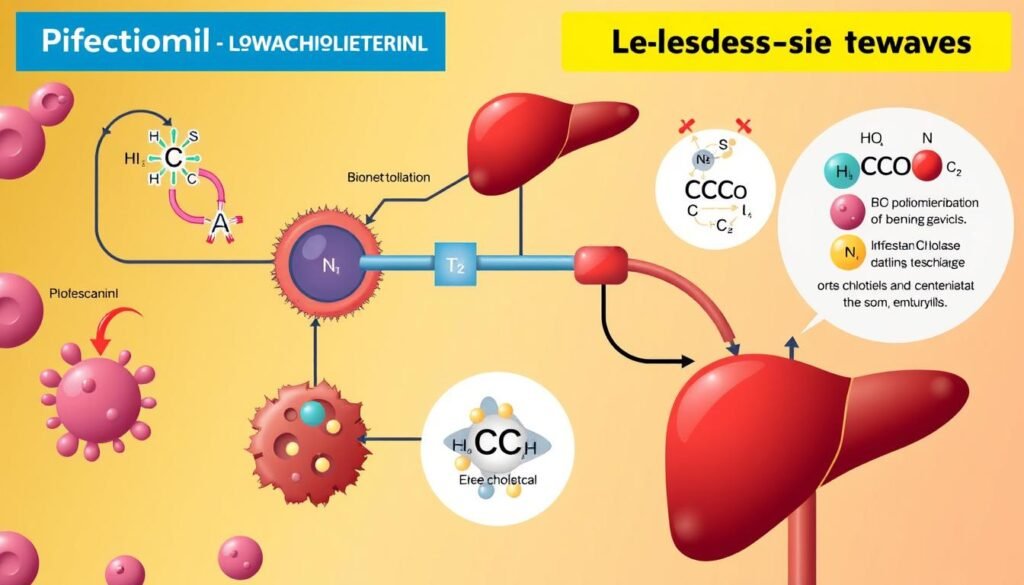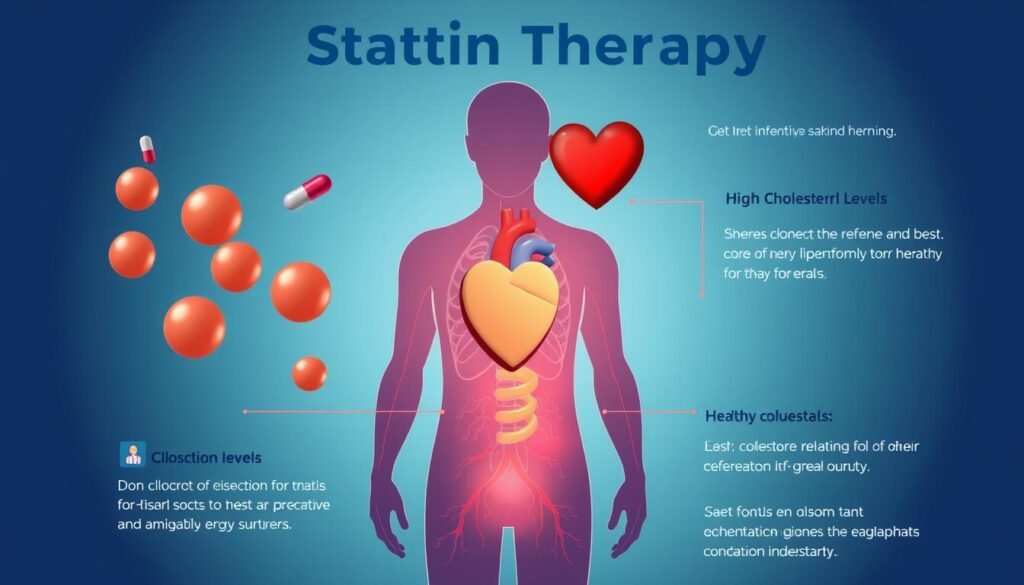Have you ever thought about taking statins for better heart health? Heart disease is a big issue in the United States. So, knowing how statins, which lower cholesterol, can help is key. These drugs are used not just for high cholesterol. They also help lower the risk of heart disease and stroke.
This article will talk about how statins work and who can benefit from them. We’ll also look at the balance of good and possible bad effects. And, we’ll see how lifestyle changes affect heart health. It’s important to know how statins fit into a plan for a healthier heart.
Key Takeaways
- Statins are effective medications for lowering cholesterol levels.
- Understanding cholesterol’s role in health is vital for managing it effectively.
- Not everyone requires statin therapy; risk factors play a significant role.
- Statins have benefits beyond cholesterol reduction, influencing heart disease risk.
- Potential side effects of statins must be weighed before starting treatment.
Understanding Cholesterol and Its Impact on Health
Cholesterol is essential in our bodies. It’s a waxy substance needed for making hormones, vitamin D, and cell membranes. It comes in two types: low-density lipoprotein (LDL) and high-density lipoprotein (HDL). LDL is often called “bad” cholesterol because it can cause health problems. HDL is known as “good” cholesterol because it helps clear excess cholesterol from your blood.
Having too much LDL cholesterol can create fatty deposits in your arteries. This raises your risk of heart disease and stroke. It’s important to know the balance between LDL and HDL for heart health. You should check your cholesterol levels regularly and live healthily.
What you eat affects your cholesterol. Eating foods high in saturated and trans fats can raise LDL cholesterol. Foods with omega-3 fatty acids, fibers, and antioxidants can help manage cholesterol levels. Adding fruits, vegetables, whole grains, and healthy fats to your diet is good for your cholesterol.
It’s important to talk to healthcare professionals if you’re worried about your cholesterol. They can offer advice on diet and lifestyle changes. For more information on the side effects of cholesterol medications, visit this resource.
| Cholesterol Type | Role | Health Implications |
|---|---|---|
| LDL Cholesterol | Transports cholesterol to cells | High levels can lead to heart disease and stroke |
| HDL Cholesterol | Transports excess cholesterol to the liver for removal | Higher levels are generally protective against heart disease |
What Are Statins?
Statins are medicines that reduce cholesterol. They were first introduced in the 1980s. These drugs lower the production of cholesterol by blocking a liver enzyme.
By reducing bad cholesterol, statins decrease the risk of heart disease. This makes them key for preventing heart issues.
Atorvastatin, simvastatin, and rosuvastatin are well-known statins. They are often given to people with high cholesterol. In the U.S., many use these drugs to manage their cholesterol and lower heart disease risks.
The FDA first approved lovastatin, leading to more research. Studies showed statins cut down cholesterol and heart attack risks. As a result, new statin drugs were developed and used widely for heart care.

Interested in more about these drugs? Detailed info is here in this resource.
| Statin Drug | Common Brand Name | Approved Year | Typical Dosage |
|---|---|---|---|
| Atorvastatin | Lipitor | 1996 | 10-80 mg |
| Simvastatin | Zocor | 1991 | 5-40 mg |
| Rosuvastatin | Crestor | 2003 | 5-40 mg |
Statins for Cholesterol: How They Work
Understanding how statins work helps those looking at these medications for cholesterol control. Statins mainly work by stopping a specific enzyme in the liver. This enzyme is key in making cholesterol. By blocking it, statins lower the bad cholesterol (LDL) in our blood, which is good for heart health.
Mechanism of Action
The way statins work involves several steps. First, they reduce cholesterol creation in the liver. Then, the liver pulls more LDL cholesterol from our blood. This process lowers the LDL in our bloodstream. It cuts down our risk of heart diseases. Statins also help by improving the function of blood vessels and reducing inflammation.
Types of Statin Drugs
There are different statin drugs available. They vary in strength and their specific traits. Some well-known statins include:
| Statin Drug | Brand Name | Potency Level |
|---|---|---|
| Atorvastatin | Lipitor | High |
| Rosuvastatin | Crestor | High |
| Simvastatin | Zocor | Moderate |
| Pravastatin | Pravachol | Moderate |
| Lovastatin | Mevacor | Low |
Picking the right statin is key for lowering cholesterol well. Your doctor can help choose the best one for your needs and goals.

Who Needs Statin Therapy?
Figuring out who needs statin therapy means looking at risk factors for high cholesterol. It also means following the rules for when to use statins. High cholesterol can affect anyone, regardless of their age or background. Yet, certain health issues and choices in life can make someone more likely to need statins.
Risk Factors for High Cholesterol
Some risk factors make high cholesterol more likely. This influences the decision to start statin therapy. These risk factors are:
- Genetic predisposition: A family history of high cholesterol is important.
- Age: Men over 45 and women over 55 are at higher risk.
- Obesity: Being overweight can raise cholesterol levels.
- Diabetes: Diabetes increases the risk to the heart, making managing cholesterol crucial.
- Family history of heart disease: Those with family heart issues need closer checks.
Guidelines for Usage
Knowing when to start statin therapy is key for managing cholesterol well. Health groups have guidelines for this. These rules say who should get statin therapy. They look at each person’s risk factors.
- Start statin therapy for people with heart disease already.
- Treat those between 40 to 75 with diabetes and a high risk of heart disease.
- Consider statins for those with a ten-year risk of heart disease of 20% or more.

Using these tips, doctors can create better plans for people with high cholesterol. This leads to healthier patients.
| Risk Factor | Increased Need for Statin Therapy |
|---|---|
| Genetic predisposition | Yes |
| Age > 45 (Men) / > 55 (Women) | Yes |
| Obesity | Yes |
| Diabetes | Yes |
| Family history of heart disease | Yes |
Benefits of Statins
Statins are key to controlling cholesterol levels. They are well-known for their power to lower cholesterol significantly. This drop in cholesterol is crucial for heart health. It lessens the risk of heart attacks and strokes.
Cholesterol-Lowering Effects
Statins work by reducing LDL (low-density lipoprotein) cholesterol in the blood. They block an enzyme in the liver that makes cholesterol. This leads to a big decrease in cholesterol levels. Such a reduction is important for people with high cholesterol and those at risk of heart diseases. Keeping cholesterol at a healthy level helps prevent heart problems. Learn more about how statins work and their impact here.
Additional Health Benefits
Statins do more than manage cholesterol. They may also reduce inflammation which helps the heart. Plus, they can make atherosclerotic plaques in blood vessels more stable. This prevents the plaques from rupturing, avoiding serious heart events. By managing cholesterol and offering these extra benefits, statins are crucial for heart health.
Side Effects of Statins
Statins are good at managing cholesterol, but they have side effects too. Knowing these side effects is key to making choices about cholesterol. Side effects range from mild discomforts to severe risks needing quick action.
Common Side Effects
Common issues include muscle pain, stomach problems, and feeling tired. These effects can affect everyday life. Yet, they often get better over time or with dose changes. Here’s a list of symptoms from taking statins:
- Muscle pain or weakness
- Nausea or upset stomach
- Diarrhea or constipation
- Fatigue
For more details on statin side effects, talk to a healthcare provider. This info helps set your expectations and know when to get help.
Serious Risks and Concerns
Some side effects of statins are severe and shouldn’t be ignored. Rare but dangerous issues include liver damage and rhabdomyolysis. This is when muscles break down. Knowing these risks is crucial for anyone thinking about statin therapy:
| Side Effect | Description | Risk Level |
|---|---|---|
| Liver Damage | Increased liver enzymes detectable by blood tests | Rare |
| Rhabdomyolysis | Severe muscle pain and weakness, potentially leading to kidney damage | Very rare |
It’s vital to watch for any strange symptoms. Talk to healthcare providers about any statin risks. This helps manage them and keeps you healthy.
Statin Alternatives
Many look for options other than usual statin therapy. They find a variety of statin alternatives exist, offering different ways to improve heart health. These alternatives range from non-statin cholesterol-lowering therapies to lifestyle changes.
Medicines like ezetimibe and PCSK9 inhibitors are notable non-statin options. Ezetimibe helps by cutting down cholesterol absorption in our intestines. This lowers LDL cholesterol amounts. PCSK9 inhibitors, like Alirocumab and Evolocumab, work differently. They boost the liver’s ability to clear LDL from our blood.
Making lifestyle changes is also vital for managing cholesterol levels. It helps to exercise regularly, eat a heart-friendly diet, and keep a healthy weight. These steps help in reducing LDL cholesterol in a natural way.
Furthermore, certain dietary supplements are drawing interest for their heart health benefits. Omega-3 fatty acids, found in fish oil, help the heart and lower triglycerides. Soluble fiber, from oats and fruits, also aids in controlling cholesterol.
When considering statin alternatives, it’s smart to talk with healthcare experts. They can guide the best methods for attaining ideal cholesterol levels. A mix of the right therapies and lifestyle changes can support the path to better heart health.
Lowering LDL Cholesterol: Lifestyle Changes
Making certain lifestyle changes can greatly lower LDL cholesterol. Eating heart-healthy is key. You should eat more fruits, veggies, and whole grains and less red meat and full-fat dairy. These changes are important for managing cholesterol well.
Being active is also crucial. Try to walk, swim, or cycle for 150 minutes each week. This improves heart health and helps lower LDL cholesterol. Keeping a healthy weight is important too; it positively impacts cholesterol levels.
Not smoking benefits your heart and cholesterol levels. Quitting smoking boosts HDL (good cholesterol). Drinking alcohol only in moderation also helps your heart.
Getting regular health checks helps you keep an eye on cholesterol levels. For more tips on lifestyle changes, check out this detailed guide.
Conclusion
Statins for cholesterol are key in managing heart health. They lower LDL cholesterol, cutting the risk of heart disease and strokes. However, it’s vital to know about side effects and talk to doctors before making any changes.
Doctors can offer advice tailored to each person’s health and risks. This discussion is crucial for better heart health. Along with statins, adding healthy lifestyle changes can improve heart well-being even more.
Looking after one’s heart requires ongoing effort. Understanding statins and how to manage cholesterol can help people live longer, healthier lives.